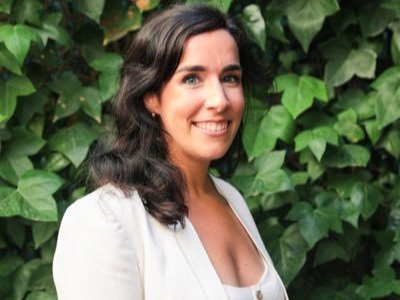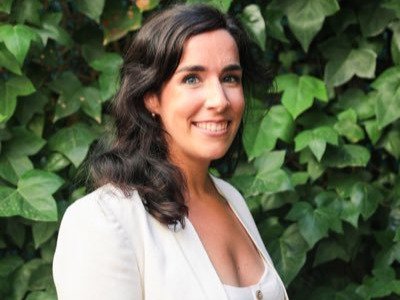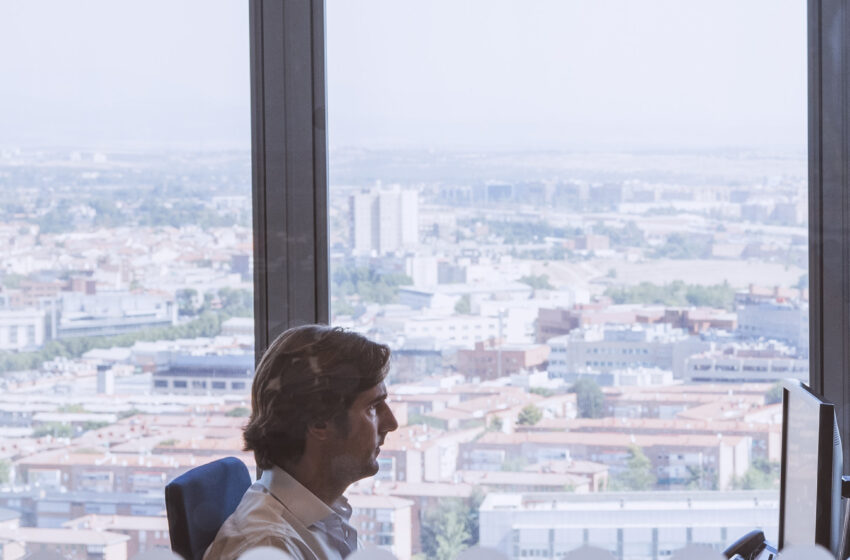Carmen del Castillo Vericat: “We lawyers are a very large collective that, united, can constitute a lobby of great relevance”

October’s Young & Unstoppable is, since July 2020, vice-president of the Barcelona Young Lawyers Group (GAJ) and, last summer, she was appointed Executive officer of the European Association of Young Lawyers. We are talking about Carmen del Castillo Vericat, an in-house lawyer at Caixa Capital Risc (CCR) responsible for investments in startups. She confesses to being a “book devourer”, practices yoga and loves to cook, especially for her friends. As it could not be otherwise, Carmen is a staunch advocate of associationism and companionship -something she learned from her father- whose example she recalls in this interview for Iberian Lawyer.
 Although you have been an in-house lawyer for more than six years, you started out in firms such as Gómez-Acebo & Pombo, where you worked in the Commercial Law department, and Deloitte Legal, a time during which you were seconded to the Real Estate department of Desigual. Was it during this time that you “got a taste” for in-house Law?
Although you have been an in-house lawyer for more than six years, you started out in firms such as Gómez-Acebo & Pombo, where you worked in the Commercial Law department, and Deloitte Legal, a time during which you were seconded to the Real Estate department of Desigual. Was it during this time that you “got a taste” for in-house Law?
The truth is that I remember my beginnings at Gómez-Acebo & Pombo with great affection and respect. It is a firm that, despite being large and renowned, has a very familiar and close spirit, and I always felt very supported by the whole team. I created bonds of friendship that have lasted to this day. However, a former professor I had at Esade convinced me to join the Commercial team at Deloitte Legal because he was creating a very ambitious project, and there I was lucky enough to work with and learn from great professionals, such as Javier Bau. He taught me to specialise in what would make me different and make me happy, avoiding becoming a little ant that followed the established path. As you say, while at Deloitte Legal, I did a secondment in the Real Estate department of Desigual. Indeed, that experience helped me to discover that the in-house lawyer is constantly in the front line of action, and I realised that in an in-house Legal department, the advice is immediate, and you see first-hand the reflection of your work as a lawyer.
Since July 2020, you have been vice-president of the Barcelona Young Lawyers Group (GAJ) and, last June, you were appointed executive officer of the European Association of Young Lawyers. Where does vocational association come from? Why do you think it is important to belong to an associative group in this profession?
My father, one of my greatest references both personally and professionally, was always very active in the Barcelona Bar Association, as well as in international Legal associations. I learned from him that in this profession, it is very important that we help each other and that networking is very important to grow professionally. I don’t think I will ever meet a person as generous as my father, who always had his office open to help everyone, both clients in difficulty and colleagues looking for guidance. Coincidentally, I joined the GAJ Executive Committee shortly before my father passed away, which I see as a nice way of taking over from him. Our profession can be very individualistic, as many Legal professionals work in small firms; that is why it is important to unite in order to have colleagues to rely on; moreover, we are a very large collective that, united, can constitute a lobby of great relevance in society, claiming ourselves as a profession with a strong will to serve.
At Caixa Capital Risc (CCR), you deal with investments in startups, mainly in Spain, the EU and the United States. Undoubtedly a sector that continues to grow despite the impasse of the pandemic. What attracted you to this work, and what are you most passionate about today? Who were your mentors, and what did they teach you?
The truth is that I really enjoy my job, as it allows me to meet very brave and brilliant people who are constantly thinking about innovation. My work at Caixa Capital Risc (CCR) is very dynamic, as we work with projects that are always different from one another; each potential investment is a world that also forces us to innovate with respect to the framework in which we work. In my opinion, CCR has done and continues to do an important job by investing in innovative ideas and has been a pioneer in many aspects, as from the beginning, it has been a management fund that has been able to anticipate what the market would demand. I also enjoy and learn from my colleagues, who have very diverse backgrounds, such as biologists, engineers or financiers, and I am in constant contact with colleagues in investment negotiations.
The role of an in-house lawyer is not always easy, as sometimes you have to raise your hand when you detect unacceptable risks, and you have to know how to convey the message empathetically to the “internal client”, who has been studying and working on investment for a long time. Beltrán Vives, the director of CCR’s Legal Department, has been a key figure in getting this far; he is one of the most analytical lawyers I know, with the best Legal instinct, capable of answering the most complex questions, and always with great common sense, a quality that I consider essential in our profession. He is someone who has always trusted me and my skills, he has given me a lot of autonomy and has allowed me to grow professionally. He also has a unique sense of humour, so working with him is a guarantee of having a good time!
Barcelona is particularly known for its concentration of startups. Have you had the opportunity to see this “hub” grow since you have been working in this sector?
Barcelona has always been characterised as a particularly open and cosmopolitan city, characteristics that I believe have served as a good basis for the creation of innovative projects. We have had the opportunity to see in recent years how startups born in Barcelona have been acquired by huge Silicon Valley multinationals, as they have detected a special talent in both the teams and the projects, and other companies have even acquired the status of “unicorn” (by achieving a valuation of more than 1,000 million dollars). Moreover, Barcelona attracts a lot of young talent, a key audience in the creation of startups and their value generation. It is, therefore, a nerve centre with great potential that I am confident will continue to grow after the hiatus suffered by the pandemic.
In order to advise investors who want to invest in a business idea, we imagine that you have to cover a wide range of different aspects. What are the most important ones?
It is important to analyse the Legal risks involved in the business idea, both for the investor and the startup; sometimes we have studied such innovative ideas that there were no specific regulations in this regard, and there have been cases in which we have helped the company itself to adjust its activity so as not to miss any Legal loopholes. It is very important to carry out a due diligence process to check the company’s situation in terms of Labour, Contractual, Corporate, Tax, etc., and also to regulate the investment through the relevant contractual documents (shareholders’ agreement, investment agreement, entrepreneurs’ contracts).
Since I started working at CCR until today, I have detected an evolution in terms of the professionalisation of entrepreneurs, and what used to project that had not taken into account the Legal aspects are increasingly startups that already have Legal advice from their incorporation, and this results in projects that are more solid from the outset.
How is your Legal department structured? Apart from in-house counsel, do you have external reference panels/firms?
In CCR’s Legal department, we are two people who provide in-house services on recurring day-to-day issues of the investees, investment-related matters, regulatory aspects, etc. In certain investments, we do have the support of external law firms. In such case, we analyse case by case the type of investment to determine the profile of the external advisor and request several quotes.
For other young Law students who want to follow your path, what academic training would you advise them? On the other hand, what qualities do you consider essential?
In my case, I did a Master’s degree in International Business Law and a postgraduate course in London thanks to a scholarship. During my degree, I did internships in different law firms, as I think it is important to understand what a lawyer’s day-to-day work consists of from the very beginning. I think that before working in a company, it is important to gain experience in different types of law firms, as the first professional years are like another Master’s degree. I always say that I have been lucky enough to learn from excellent professionals, spending many hours sitting next to them and learning everything, from how to write a legal document to how to deal with the client. My advice is that, whenever you can work close to a talented person, get as close to them as possible to absorb the knowledge that you wouldn’t have access to any other way. It is a profession in which having a reference figure is extremely important, to learn, to lean on that person, to follow in their footsteps while at the same time marking your own path. Furthermore, I firmly believe in the enriching aspect of working and interacting with people who are different from you; you learn from different points of view, and it gives you an open mind, which is essential to dedicate yourself to this profession. Working in Corporate Legal Consultancy requires the ability to react to unexpected problems; to know how to analyse issues in which you are probably not specialised (which entails a constant capacity for study and research, as well as creativity to build innovative solutions); to have empathy and assertiveness to gain the trust of your internal client and at the same time be able to set the limits and boundaries of what cannot be done.
You are a young woman who has already positioned herself with a relevant role in her generation’s Legal sector. You are also close to the example of Maria Eugenia Gay. She is also a reference for many other women who want to participate in decision-making forums and who believe in equality in the Legal sector. What is your opinion on this?
For me it is important to follow a path with principles and coherence; I studied law to help other people, and I started the associative path because I consider that I have been lucky enough to have people who have guided and oriented me and I think it is fair to give back to the collective what I have received. Maria Eugenia Gay has always had a special sensitivity towards young lawyers, and that gave us a lot of wings so that the GAJ Committee could be ambitious and adopt very innovative initiatives, giving us a loudspeaker and positioning us as a group of young people with great sensitivity to help our colleagues. It is also important that there are women in leadership positions, as I believe that in order to break down stereotypes and mental barriers it is essential for young female colleagues to see that other women lawyer are good leaders. Although it is true that much progress has been made in the field of equality, we must not forget that there is still a long way to go.
The group of young women lawyers is particularly vulnerable, as it combines the precariousness that young people suffer in their first years in the profession and the enormous amount of prejudice due to the fact that they are women. On many occasions, young female colleagues are treated with excessive paternalism, they are judged for decisions in their personal lives, their professional careers are limited by the possibility of motherhood, by whether or not they have a partner, by whether or not they are dressed up or badly dressed. Unfortunately, it is very common to hear comments such as “Oh, you look like a girl, have you just graduated?”, or that a colleague is asked in job interviews if she has a partner. I was even reproached on one occasion for not being “masculine enough” to dedicate myself to business law. There is still a long way to go, a lot of social cultures to change, many stereotypes to eliminate. I also believe that conciliation and equality must be approached as a task for all of us, women and men, I prefer to avoid confrontation between one and the other, I believe that we will only achieve true equality in the profession and in society when we all seek to work side by side, on the same level. In this sense, I learned a great deal from Pol Olivet, who was President of GAJ, because I understood that it is just as important for women to demand equality as it is for this demand to be backed up by colleagues, and for them to pursue co-responsibility as much as we do.
What other concerns do you have about the Legal sector in our country?
It is important to fight for the rights of younger colleagues, as they are currently facing many obstacles in their careers: on the one hand, a large number of young people are forced to work as fake self-employed, usually in small and medium-sized offices. On the other hand, although it is a profession that requires long hours, too often young people are abused to work marathon days, taking advantage of the fact that they want to learn and that there is a lot of competition.
What hobbies and interests do you enjoy, and what do you relax with?
I have been practising yoga for many years, and I am passionate about cooking. I also like to share it with the people I love, family and friends, and there is nothing that makes me happier than inviting them to share what I cook. I even had a cooking blog for about four years, where I wrote recipes that my mother and I prepared. I love to travel, although, with the pandemic, this hobby has had to take a pause, I have taken the opportunity to walk in the mountains and connect with nature. I am also a bookworm; I like to keep up to date with literary trends as much as I like to read the classics.
By Desiré Vidal
To read the full interview on issue number 108 click here.












